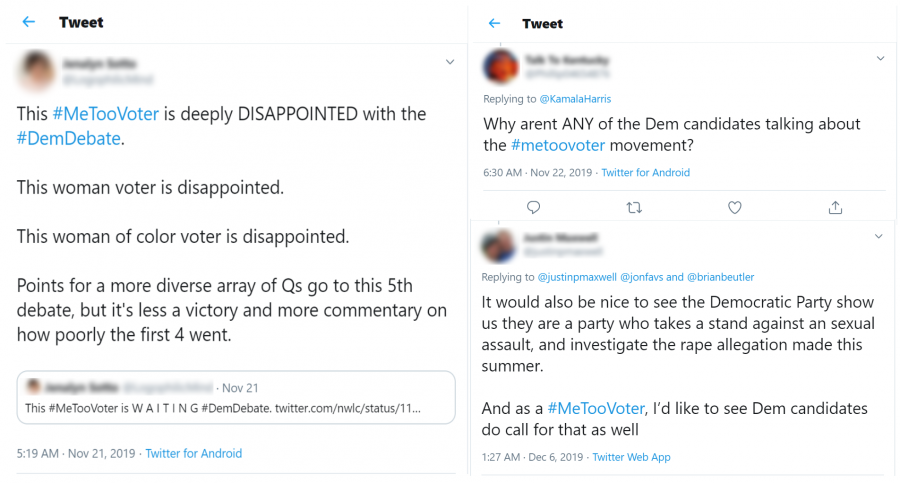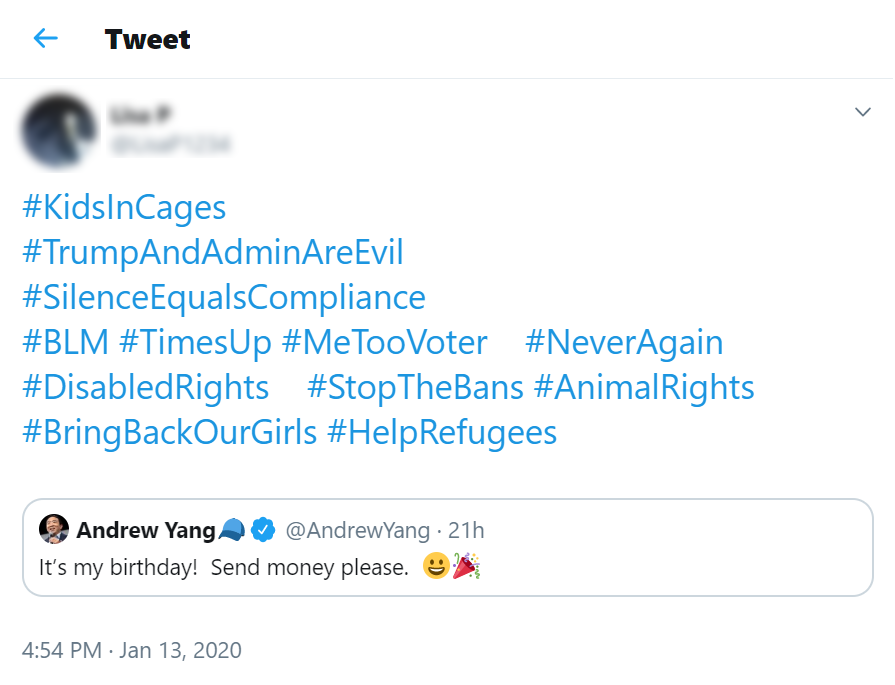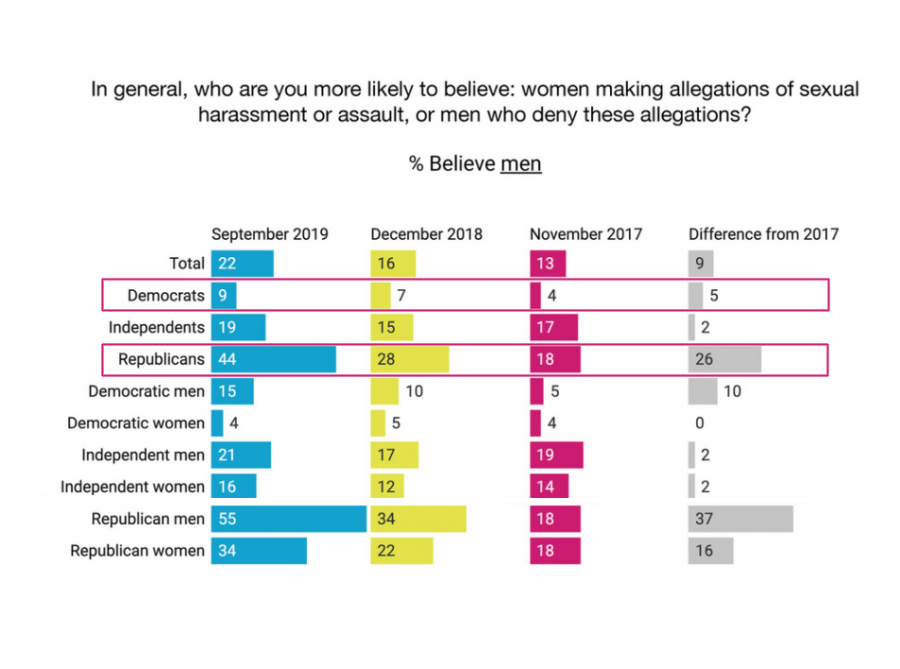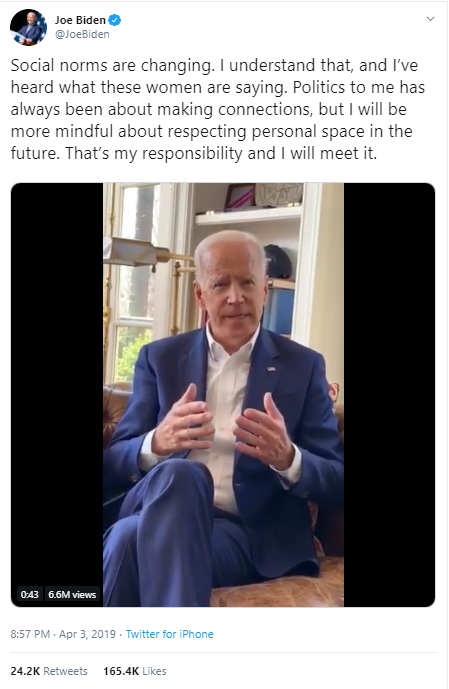
Will the #MeTooVoters make a difference in the 2020 elections?
In light of the upcoming 2020 US presidential elections, the #MeTooVoter hashtag was launched to address the importance of the discussion on sexual harassment in the race for the next POTUS, and to hold politicians accountable for (not) addressing sexual violence. In this article, I will look into the #MeTooVoter hashtag, and examine why it has not been able to inspire the uptake it needs in order to make a difference in the 2020 elections.
In October of 2017, the #MeToo hashtag took over the internet as women shed light on a culture of sexual harassment by sharing their stories online. The spread of this hashtag followed the Weinstein allegations and started a global movement that is still relevant today. In the run-up to the 2020 presidential elections, the topic of #MeToo and sexual harassment has not been playing a key role in the Democratic debates. It seems like the topic has been put on the backburner in the Democratic party in the midst of other hot topics, like the debate on climate change and the discussion on universal health care. To address the importance of the topic of sexual violence in the 2020 elections, the founder of the #MeToo movement, Tarana Burke, launched the #MeTooVoter hashtag.
The #MeTooVoter movement
The hashtag #MeTooVoter was first introduced on the 15th of October 2019, on the anniversary of #MeToo and the day of the fourth Democratic presidential debate. It was unveiled by the founder of the #MeToo movement Tarana Burke on Twitter. Burke is using the success of #MeToo to turn the movement into political capital, by mobilizing it into an active voter base for the 2020 elections. Burke describes the motivation behind the hashtag as following: “We want a presidential candidate who will legislate to protect people from sexual violence and also provide resources for people who’ve experienced it. Nobody has spoken to that.”
According to Burke, the members of the #MeToo movement in 2017 can be seen as a power base, which will be mobilized in the elections to make a difference in American politics: “You can’t have 12 million people respond to a hashtag in this country within 24 hours and they not be constitutes, taxpayers, and voters.”
However, to deliberate over the chances of success that the #MeTooVoter campaign has in 2020, we first have to look into the development of the #MeToo movement in American politics.
The evolution of the #MeToo mindset in politics
Discussion on sexual harassment was almost non-existent in American politics for many years, and rumours on sexual misconduct in Washington were often immediately dismissed or ignored. During Donald Trump's presidential campaign, numerous women came forward with allegations against him, claiming sexual harassment or intimidation. This led to media coverage and discussion on the topic, but did not prevent Trump from getting elected as the 75th POTUS in 2016.
However, since the #MeToo movement in 2017, it seems like a lot has changed. Several elected politicians have been removed or asked to leave due to rumours or allegations of sexual misconduct. Also, in the 2018 midterms, the topic of sexual harassment played a key role due to the allegations against Supreme Court nominee Brett Kavanaugh. This led to a change in power when a record number of women were elected to take office.
The #MeTooVoter campaign now tries to build on these developments in American politics, by capitalising on the popularity of #MeToo to start a new movement of voters who will cast their ballot in favour of a candidate who will legislate on the problem of sexual violence.
Examining the #MeTooVoter hashtag
When looking at the #MeTooVoter hashtag on Twitter, one notices that the hashtag has not been able to find a broad audience thus far; the number of times #MeTooVoter has been mentioned on Twitter is rather minimal. Over the last month, the hashtag has only been used roughly 100-200 times on the platform. The people that do use the hashtag seem to be mostly Democratic voters. This assumption is made because the discourse of the tweets using #MeTooVoter is based almost entirely on the Democratic candidates, and how they are failing to speak out on the topic of sexual harassment during the Democratic primaries. Therefore, most of the tweets on the topic express a feeling of anger or disappointment against the Democratic candidates and their performances in the debates.

Compilation of #MeTooVoter tweets
In several other cases, the #MeTooVoter hashtag is used in tweets that are not primarily related to the topic of sexual harassment. For example, in a portion of the tweets, the hashtag is used within a string of other well-known hashtags related to social justice issues. Examples are the #MeToo and #TimesUp hashtags, but also seemingly unrelated hashtags like #BLM, #TrumpAndAdminAreEvil and #HelpRefugees.

A #MeTooVoter tweet, using a compilation of left-wing hashtags
This same compilation of hashtags can be found regularly as a response to tweets by several Democratic candidates and other political figures. It seems like the purpose of this is to create uptake by linking #MeTooVoter to other topics that are playing a role in the current political climate and the upcoming elections. This strategy, however, has not been successful thus far.
Apart from minor exceptions, the #MeTooVoter hashtag is used mostly by a handful of the same accounts, of which some seem to be behaving like Twitter bots. Bots are internet robots that are algorithmically controlled for automated social media activity (Maly, 2018a). Twitter bots are specifically designed for use on Twitter and often imitate human behaviour, which makes them rather difficult to recognize. Some of the accounts using #MeTooVoter are most likely Twitter bots as they exhibit an inhuman amount of activity, use twitter handles containing strings of numbers, have unrecognisable profile pictures and mostly retweet others. These factors are generally seen as indicators of bot behaviour. The use of so called "social bots" for political goals is not unusual. In the age of digitalisation, networked social movements use them regularly to spread (false) information, or to generate likes and support for politicians (Maly, 2018a).
#MeTooVoter as a networked social movement
The rise of the internet and its social networks has had a significant effect, among other things, also on the way our political systems work. The internet gives individuals the power to contribute to the discussion, join movements and strive for social change. In this way, social networks have made it possible to participate in activism from the safety of one's own home. The #MeTooVoter and #MeToo movements are both good examples of such networked social movements.
Low-effort activism characterises networked social movements as the platforms of social media are built around weak ties.
An important characteristic of networked social movements is that they are, first and foremost, movements that require relatively low effort; one is able to join in by simply tweeting out a hashtag. According to Paulo Gerbaudo (2012), this kind of low-effort activism characterises networked social movements as the platforms of social media are built around weak ties. Joining an online movement will most likely not involve financial or personal risk, and it rarely requires confronting socially entrenched norms and practices (Gladwell, 2010). Writing for The New Yorker, Malcolm Gladwell argues that online activism is “the kind of commitment that will bring only social acknowledgement and praise”. Belarusian internet sceptic Evgeny Morozov warns about the effects of low-effort activism coining the term "slacktivism". He describes this phenomenon as "feel good activism that has zero political or social impact."
Although both the #MeToo and #MeTooVoter movements can be seen as such networked social movements, they cannot exactly be described as low-effort activism. Speaking out about experiences of sexual harassment is still a huge taboo topic. It is, however, true that the virality of the #MeToo movement made it easier for women to speak out about the topic.
The successes of #MeToo
The #MeToo movement constitutes an interesting phenomeon as it has been able to cause real social change, despite the fact that it can be described as slacktivism or "hashtag activism" due to its low-effort nature. This can be explained in part by the virality of the movement; the sheer size of the movement is likely what made the difference, not so much the individual motivation of the online activists. Another important key to the success of the #MeToo movement was its uptake by celebrities. Tarana Burke initially founded the movement in 2009, but it didn’t make headlines until American actress Alyssa Milano tweeted the hashtag in 2017. The celebrity uptake, combined with the momentum of the Weinstein allegations, made the #MeToo movement as famous as it is today.
The advantages of algorithmic activism
In order for a networked social movement to succeeded in today’s society, its uptake on social media and its popularity and virality are extremely important. It is therefore not remarkable that digitalization and the use of social media have led to a new form of activism, so-called "algorithmic activism" (Maly, 2018b). Maly (2018b) describes algorithmic activism as a kind of activism that spreads the message of a movement by “interacting with the post in order to trigger the algorithms of the medium, so that it boosts the popularity rankings of the message and the messenger”. The activists have knowledge of the algorithmic construction of the medium they are using, and apply it to their messaging order to gain popularity and virality.
Digitalization and the use of social media have led to a new form of activism, so-called "algorithmic activism".
In a way, it seems like the activists pressing the #MeTooVoter hashtag are using their knowledge of social media algorithms to achieve their political goals as they presumably make use of Twitter bots to spread their hashtag. However, three months after the hashtag was first unveiled, there has still been no major uptake. This indicates that the activists pushing for #MeTooVoter to gain momentum might not have enough knowledge about Twitter as a medium to use it to their advantage. If they want their message to make it onto the debate floor, they might be better off looking at the successes of #MeToo and again using celebrities to create a viral campaign.
The priorities of the American voter
Overall, the general question that remains is, does the American voter simply not care enough about the issue of sexual violence for it to be a factor in his/her voting behaviour? One thing is clear: the opinions of Democratic and Republican voters on this topic differ significantly. According to a study conducted by the Center for American Women and Politics (CAWP), Republican voters were less likely to label certain acts as sexual harassment than Democratic voters, and more likely to ascribe this behaviour to the idea of “boys will be boys”. This indicates that Republican voters are less likely to see acts of sexual harassment as problematic in society, in contrast with Democratic voters. These findings are in line with a report by PerryUndem (2019), which stated that Republican voters are more likely to believe men denying allegations of sexual harassment than the women making the allegations. According to this report, 44% of Republican voters said they are more likely to believe men, in contrast with only 9% of Democratic voters.

Graph showing how American voters think about allegations of sexual harassment
Despite all this, Joe Biden has been one of the leading candidates for the Democrats, a man who has been involved in some remarkable #MeToo moments himself. This could indicate that the topic of sexual violence is not a priority for the majority of the Democratic voters.
Joe Biden’s #MeToo moments
The discussion on sexual violence and #MeToo has been mostly absent from the Democratic primaries. In the 5th debate, however, one question was asked on the topic and Joe Biden responded with the line "we need to keep punching at it", a phrasing that rings highly inappropriate considering the topic at hand. Apart from this awkward performance on the topic, Biden’s name is mentioned more regularly in combination with the #MeTooVoter hashtag on Twitter. This is primarily the case because the former vice president has been at the centre of a #MeToo scandal earlier in 2019. Several women accused him of inappropriate touching, which led to some minor outrage on social media. After addressing the issue and confessing to his behaviour to a certain degree in a short video on Twitter, most of the discussion seemed to mellow out. Nonetheless, members of the #MeToo movement accuse him of never apologizing for this behaviour.

The Tweet in which Joe Biden addressed his #MeToo controversy
Despite his questionable affilliation with the topic of sexual misconduct, Biden has been in the lead in many polls. This could be indicative of the current mindset in the Democratic party: the focus on defeating Trump in 2020 is so strong that all other considerations seems to fade. This might be why many Democratic voters are most likely opting for a more traditional and conservative politician like Joe Biden in spite of his #MeToo controversy.
Conclusion
The #MeToo movement has been both important and influential in shaping political debate in the US over the past few years, and there is no doubt that the movement has led to societal and political change in the country. In case of the 2020 elections however, the discussion on sexual harassment will most likely not determine who becomes the next president of the United States.
The attempts of #MeToo activists to gain new popularity and virality through the new #MeTooVoter hashtag have not been fruitful thus far. This could be an indicator of the likelihood of them mobilizing a physical, offline movement that will vote for a candidate that will legislate on sexual harassment. The desire to defeat Trump in 2020 is simply too strong for the Democratic party, and issues like sexual harassment and women’s rights will not be substantive in the upcoming elections simply because Democratic voters seem to hold much more importance to it than Republicans. It is, however, too soon to determine if the #MeTooVoter movement will make a difference in 2020, while it is clear that the wave and virality of #MeToo has led to a certain change in culture in American politics. For now, it looks like the #MeTooVoter movement has overestimated its potential for political influence.
References
Gerbaudo, P. (2014). Tweets and the Streets. Social media and contemporary activism. London, England: Pluto Press.
Gladwell, M. (2010). Small Change: Why the revolution will not be tweeted. The New Yorker.
Maly, I. (2018a). Nieuw Rechts. Berchem, Belgium: EPO.
Maly, I. (2018b). Populism as a mediatized communicative relation: the birth of algorithmic populism. Tilburg Papers in Culture Studies, 213.